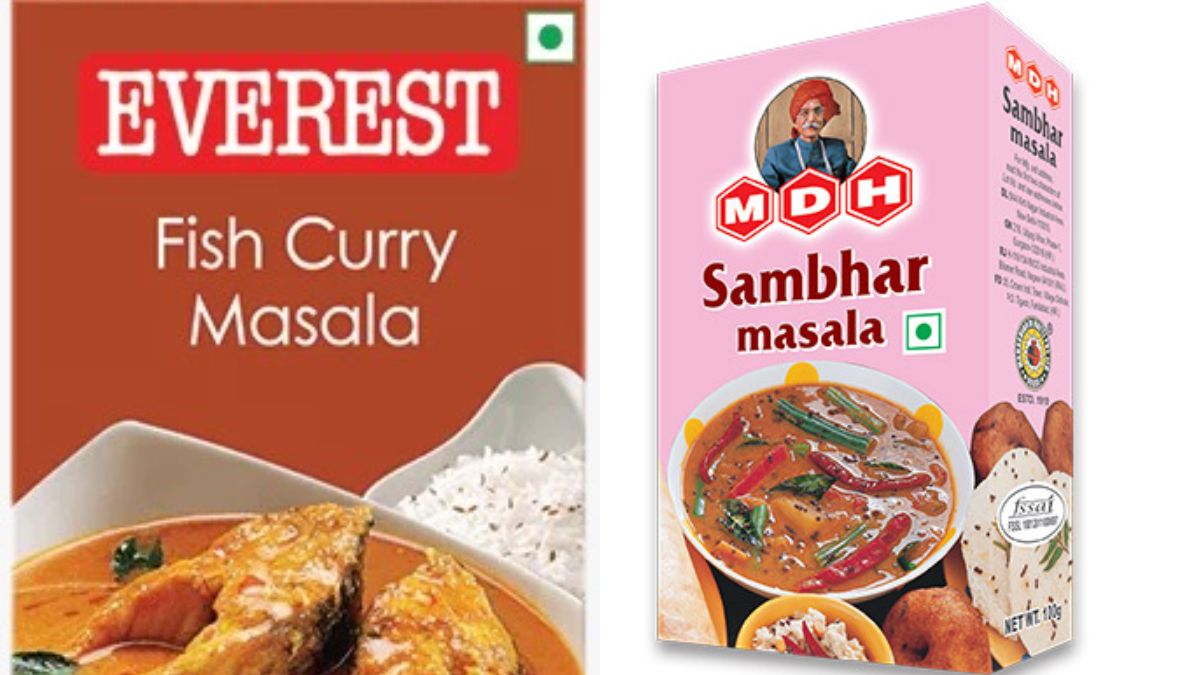India’s powdered spices are under scanner. The country’s apex food regulator, the Food Safety and Standards of Authority India (FSSAI), has reportedly asked states to collect samples of different spices to carry out quality checks.
The development comes after food regulators in Hong Kong and Singapore recalled several products of India’s top spice brands – MDH and Everest – after detecting the presence of ethylene oxide, a cancer-causing chemical.
What is the row? What has been the response? What is ethylene oxide?
Let’s take a closer look.
Singapore, Hong Kong’s move
Authorities in Hong Kong have withdrawn four spice blends – MDH’s ‘Madras Curry Powder’, ‘Sambhar Masala Powder’ and ‘Curry Powder’ and Everest Group’s ‘Fish Curry Masala’.
Hong Kong’s Centre for Food Safety (CFS) of the Food and Environmental Hygiene Department said on its website early in April that it “collected the above-mentioned samples from three retail outlets in Tsim Sha Tsui, respectively, for testing under its routine food surveillance programme. The test results showed that the samples contained a pesticide, ethylene oxide. The CFS has informed the vendors concerned of the irregularities and instructed them to stop sale and remove from shelves the affected products,” reported Hindustan Times (HT).
It further warned about ethylene oxide, pointing out that the chemical has been classified as a Group 1 carcinogen by the International Agency for Research on Cancer (IARC).
Impact Shorts
More ShortsThe Singapore Food Agency (SFA) has also ordered back Everest’s ‘Fish Curry Masala’ after finding ethylene oxide at levels “exceeding the permissible limit”.
The regulator asked Sp Muthiah & Sons, the importer of the spice, to recall the product. “Ethylene oxide is a pesticide that is not authorised for use in food. It can be used to fumigate agricultural products to prevent microbial contamination. Under Singapore’s Food Regulations, ethylene oxide is allowed to be used in the sterilisation of spices,” the SFA said in its press release.
Everest reacts
Everest Food Products Pvt has responded to the controversy, saying its spices have not been banned in Hong Kong and Singapore.
“There have been reports of Everest being banned in Singapore and Hong Kong, but we want to clarify that this is false. Everest isn’t banned in either country. Only one out of 60 Everest products has been held for examination,” a company spokesperson told NDTV Profit.
The spokesperson said one of Everest’s products has been “temporarily” put on hold in Singapore after Hong Kong’s alert.
The company asserted that its products are “safe and of high quality”. “Everest upholds strict hygiene and safety standards in its manufacturing facilities,” it added.
FSSAI to test samples of spices
Following the action by Hong Kong and Singapore authorities, the FSSAI will test samples of spices from all the manufacturing units in India.
Top government sources told NDTV, “All the food commissioners of the country have been alerted. The process of collecting samples of spices has been started. The order has been given. In three to four days, samples will be collected from all the spice manufacturing units of the country”.
The report will be out from the lab in around 20 days, they said.
As per a senior Indian official, these spices will be inspected for the presence of ethylene oxide, Reuters reported.
Ethylene oxide is banned in food products in India. Sources told NDTV that strict action will be taken if “harmful substances are found in Indian spices”.
What is ethylene oxide?
Ethylene oxide is a colourless, flammable gas at room temperature with a sweet odour. It is chiefly used to manufacture other chemicals, including ethylene glycol (antifreeze), as per the National Cancer Institute (NCI).
It is also used to make textiles, detergents, polyurethane foam, medicine, adhesives and solvents. Ethylene oxide is used as a fumigant for food spices to prevent microbial contamination, such as E. coli and Salmonella.
It can damage DNA which makes it an “effective sterilising agent”, according to NCI. The chemical is used in hospitals to sterilise surgical equipment.
People can be exposed to the chemical by inhaling contaminated air or via smoking tobacco. Workers like those involved in fumigation or production of the chemical can also be exposed to ethylene oxide, as per the United States Environmental Protection Agency (EPA).
Why is it so harmful?
It is a chronic health hazard. The IARC lists ethylene oxide as a ‘Group 1 carcinogen’, which means it has “enough evidence to conclude that it can cause cancer in humans”.
Those exposed to the chemical for a long time could face irritation of the eyes, skin, nose, throat, and lungs, and damage to the brain and nervous system.
Exposure to ethylene oxide can heighten the risk of lymphoid cancer, and breast cancer in women, according to EPA.
It is a harmful pesticide that is not fit for human consumption.
“While the risk from occasional, low-level exposure may be minimal, spices and spice blends like those flagged are commonly used in household cooking across multiple dishes. This can lead to chronic, persistent exposure over time, which has been linked to an increased risk of cancers like leukemia, stomach cancer and breast cancer,” Kanika Narang, nutritionist at Delhi’s Indraprastha Apollo Hospitals, told Indian Express.
With inputs from agencies
)